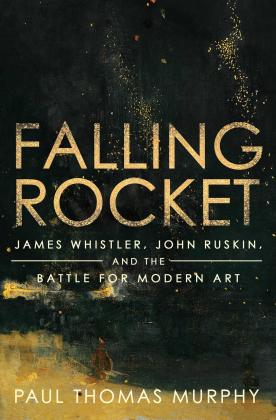
| Format | Hardcover |
| Publication Date | 12/05/23 |
| ISBN | 9781639364916 |
| Trim Size / Pages | 6 x 9 in / 400 |
A New York Times Book Review Editors’ Choice
The untold story of the artistic battle between James Abbot MacNeill Whistler and John Ruskin over Whistler’s controversial, ground-breaking Nocturne in Black and Gold: The Falling Rocket.
In November 1878, America’s greatest painter sued England’s greatest critic for a bad review. The painter won—but ruined himself in the process. The painter: James Abbot MacNeill Whistler, whose combination of incredible talent, unflagging energy, and relentless self-promotion had by that time brought him to the very edge of artistic preeminence. The critic: John Ruskin, Slade Professor of Art at Oxford University, whose four-decades’ worth of prolific and highly respected literary output on aesthetics had made him England’s unchallenged and seemingly unchallengeable arbiter of art.
Though Whistler and Ruskin both lived in London and moved in the same artistic world, they had, until June, 1877, managed to remain entirely clear of one another. This was unusual because Whistler had a mercurial temperament, a belligerent personality, and seemed to thrive on opposition: he once challenged a man to a duel because the man accused the painter of sleeping with his wife. (Whistler had, in fact, slept with the man’s wife.)
That November, John Ruskin walked into the Grosvenor Gallery’s new exhibition of art and gazed with horror upon Whistler’s Nocturne in Black and Gold: The Falling Rocket. The painting was Whistler’s interpretation of a fireworks display at a local pleasure garden. But to Ruskin it was nothing more than a chaotic, incomprehensible mess of bright spots upon dark masses: not art but its antithesis—a disturbing and disgusting assault upon everything he had ever written or taught on the subject. He quickly channeled that anger into a seething review.
The internationally-reported, widely discussed, and hugely-entertaining trial that followed was a titanic battle between the opposing ideas and ideals of two larger-than-life personalities. For these two protagonists, Whistler v Ruskin was the battle of a lifetime—or more accurately, a battle of their two lifetimes. Paul Thomas Murphy’s Falling Rocket also recounts James Whistler’s turbulent but triumphant development from artistic oblivion in the 1880s to artistic deification in the 1890s, and also Ruskin’s isolated, befogged, silent final years after his public humiliation.
The story of Whistler v Ruskin has a dramatic arc of its own, but this riveting new book also vividly evokes an artistic world in energetic motion, culturally and socially, in the last decades of the nineteenth century.
Paul Thomas Murphy is the author of Shooting Victoria, a 2012 New York Times notable book. He holds advanced degrees in Victorian Studies from Oxford and McGill Universities and the University of Colorado, where he taught both English and writing on interdisciplinary topics. He currently resides in Boulder, Colorado.
Buy it now in print:
Buy it now in ebook:
"Paul Thomas Murphy’s fluent and accessible new book provides a snapshot of the founding litigation of modern art. As this book makes clear in its minute recounting of the 1878 trial, the jury was asked more than just 'is it art?' The question became whether the intangibles behind creation (concept, intent, timing) can be said to belong to any art object. From Whistler to Pollock, it’s a question given welcome weight by Murphy’s lively reportage and sensitivity to the aesthetics of the time." Hyperallergic
"Enjoyable in its breezy enthusiasm. An unashamedly approachable good read.” New York Times Book Review
"Victoriana scholar Murphy hits another bull’s-eye with this remarkable new title. The author relates a surprisingly overlooked true story about the generational conflict between the rigidly conservative London art world and the impending ideas of modernism. Absorbing and informative, this title is cultural history at its best." Library Journal
"A lively, entertaining tale of art and criticism. Murphy chronicles the intellectual fight between American painter James Whistler and British art critic John Ruskin." Kirkus Reviews
Praise for Paul Thomas Murphy:
“I would like to have been taught by Paul Thomas Murphy. He’s the most free-spirited of scholars.” John Sutherland, The New York Times Book Review
“Murphy displays a novelist’s gifts in this fascinating true crime account. Murphy captures the drama of the flawed investigation, and the legal proceedings that followed. His solution to the crime?based on current forensic science?is likely to be the last word on the case.” Publishers Weekly
“This fascinating account of a Victorian murder, complemented by the added strength of a rich description of the period’s society and judicial system, should be a solid addition to academic and true crime collections.” Library Journal
“Entertaining. This highly readable story still shows the cleverness of the police and the frustrations of prosecutors.” Kirkus Reviews
“Although Murphy is mainly interested in the advances of forensic science, his lively narrative, with its unambiguous tone of outrage, is also a takedown of the social system.” Marilyn Stasio, The New York Times Book Review